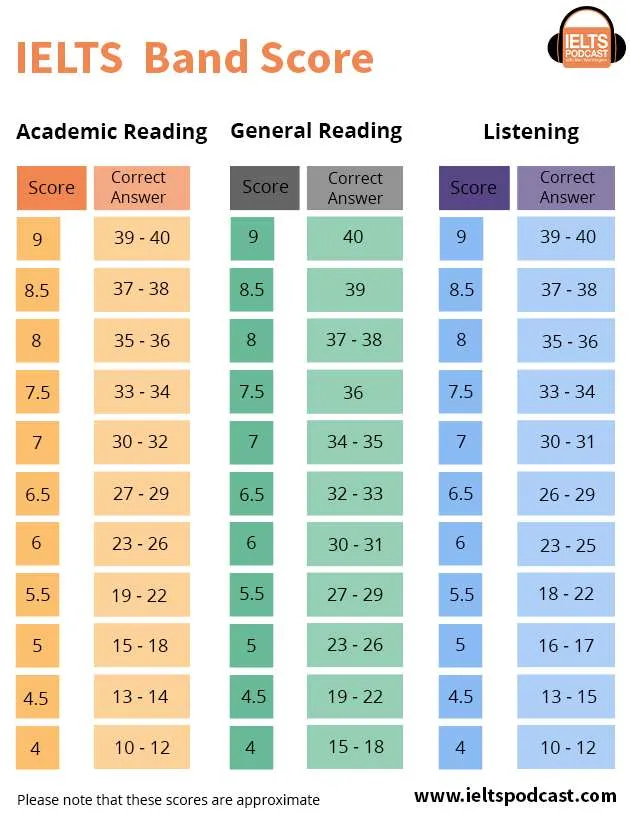
When you do a practice test, keep track of your score and monitor your progress.

In this article we will show you how to:
- Work out your IELTS score
- Understand the difference between an IELTS band chart and a general IELTS score calculator
What is an IELTS band score chart?
Put simply, these are the charts you’ll see for IELTS reading and listening to work out your reading band scores after completing a practice test. There are 40 questions in the reading and listening tests, so the band chart matches marks out of 40, known as the raw score, for reading and listening to a band score. If you get 34 out of 40, it will tell you that’s about a band 7.5. You’ll need 39 or 40 out of 40 for band 9. These are useful to track your progress over time.
How does a general IELTS score calculator work?
Each skill (the speaking test, IELTS academic writing, the listening test and the IELTS reading test) would receive an overall band score and this can be calculated from an IELTS score table. Many students struggle to work out what their overall score might be after completing practice tests and receiving feedback. (IDP have a good one on their website)
How does an IELTS writing band score calculator work?
A lot of students get worried about their IELTS writing band score and how to know whether they are on track or not. There isn’t a band score chart for writing and speaking, because these scores are the average of 4 skills and need to be awarded by a qualified examiner. Only an expert could judge your lexical resource or grammatical range. However, the writing band score calculator part of a general IELTS score calculator takes the two scores you have received from a marking service and recalculates them in the same way that the IELTS test writing score calculator would do. Remember that task one is worth 1/3 of the marks and task 2 is worth 2/3, if you received an overall score of 7 for task 2 and 6 for task 1, your final score would be 6.5 for writing.
There are some websites that use AI to run a writing band calculator (free) and suggest that if you input an essay, their writing task 2 score calculator can predict your writing score, but remember that these IELTS writing score calculator sites are still being developed and you will get a more accurate idea by using an essay correction service which employs ex-IELTS examiners, like our essay writing service.
Unlock Your Potential with our Online IELTS Essay Checker
Preparing for the IELTS can be a big job. Everyone wants a good score, right? This is why we made a tool to help you, It’s called the online IELTS essay checker.
What’s so special about this tool? It looks at your essays and tells you how to make it better. This way, you can learn faster. And you don’t need to wait for someone else to check your essays.
The online IELTS essay checker does it quickly. Here’s another good thing: it can help you save money. We know that classes and books for IELTS can cost a lot. Our tool is cheaper and helps you in the same way.
After you use the band score calculator on this page, try our online IELTS essay checker. It will help you see where you need to get better. We made it to help you get ready for the IELTS without spending too much money or time.
So, if you want to get a better score and save money, our online IELTS essay checker is here for you.
Final thoughts
Overall, regularly using an IELTS score chart for reading and listening, as well as a band score calculator will help you track your progress and identify any problem areas. It’s also encouraging for students who worry about their performance in certain skills. Even if your IELTS writing task 2 is a challenge in the IELTS writing test, or your listening score tends to be lower than reading, the average overall score will likely help you achieve your goals.